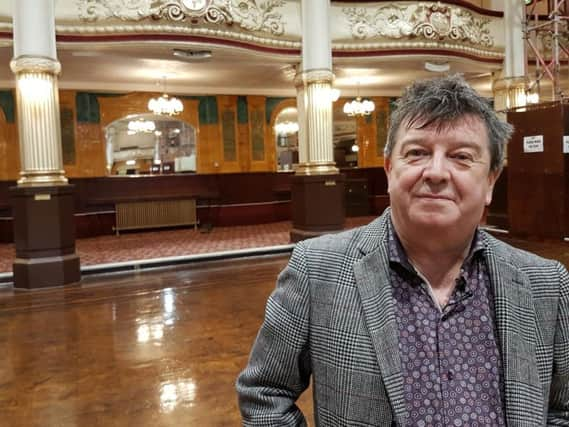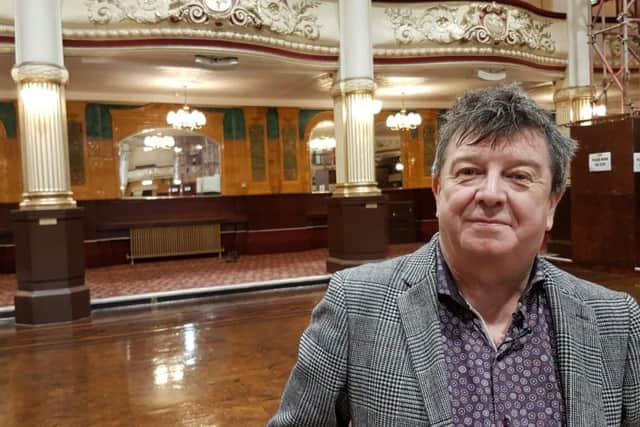Watch - Stuart Maconie reveals how Blackpool turned into the empire of the fun


But his new programme reveals the links between this worker’s playground on the Fylde coast and the treasures being brought back from the British Empire at the turn of the 20th century.In Civilisations Stories, Wigan-born writer and broadcaster Stuart travels the north west, looking at the legacy of Empire, for good and bad, and the impact its art has had on the region.And it is in Blackpool where we see the crowning glories of the Empire, expressed in the entertainments arms race between the two princes of the Prom, the Tower and the Winter Gardens. From the imperial pomp and opulence of the Empress Ballroom – named, of course, after Queen Victoria, Empress of India – to exotic animals which prowled the Tower’s circus, and to elaborate friezes of tropical birds and ornate gold plasterwork of the two iconic landmarks.Of course, India and the Empire exported the raw materials which were refined by workers in Lancashire, in the mills of Preston, Burnley and Wigan, then it was sent across the world, creating the money for those workers to spend in resorts like Blackpool and Morecambe.But Stuart says all this gilded extravagance passed him by on his early trips to Blackpool.“I’ve been to quite a few gigs at the Winter Gardens over the years,” says Stuart. “I saw James there at the height of their Madchester phase, and I stayed in a bed and breakfast that cost the princely sum of £8.“It was called Le Chateau, I don’t know if it’s still there. Me and my mates just thought, why don’t we stay instead of getting the last train?“We couldn’t argue with £8, even in 1993, that was cheap.”
But did those concert-goers twig it was all about giving the working classes a taste of the imperial opulence enjoyed by the rich?“It never occurred to me, but of course what basically the whole Winter Gardens complex was intended to do was an attempt to bring the exoticism of empire and far-flung territories of India to the working classes, so there’s lots of exotic decorative stuff, and even down in the Tower circus, you’re seeing the animals that only people who could afford to travel would have seen.“Of course, then it wouldn’t have all the negative connotations of Empire.”And that’s a bit of a problem these days. Our attitude of changed, rightly, to look on the Empire as something which should be looked at critically, not accepted as ‘a good thing’.Crucially, Civilisations Stories tackles the uncomfortable baggage which Empire brings with it.“I’m not someone who thinks we should pull down statues –well maybe some statues should be pulled down –but I think you credit people with intelligence to see things in an historical context,” says Stuart.“I’m not a fan of no-platforming and banning things, because I think you let people make informed judgements, you say this was a period in our history we have much to be ashamed about, it’s also a period which is historically and sociologically interesting.“You can’t brush things under the carpet, you must expose them to the light of scrutiny.”In the company of Blackpool’s heritage and conservation manager, Carl Carrington, Stuart delves beneath the surface of the Tower too, revealing the cages beneath the floor of the circus where the lions and tigers which once amazed holidaymakers were kept.Stuart says: “That’s another thing now where people would say it’s appalling to have animals locked up for entertainment like that, and it is, and you can say that about zoos and so on.“But coming from Wigan, I didn’t see many free-range lions and you have to put things in context and see them in the historic and economic circumstances they were made in , I think.”In Manchester, he takes a look behind the scenes of The Manchester Museum, taking in some of the 4.5m natural history exhibits in one of the empire’s new municipal museums, “‘set up to combat the prevailing vice of intoxication among the working classes’. In other words, to keep people out of the pubs.”


Advertisement
Hide AdAdvertisement
Hide AdTo Stuart, those patrician explorers of Empire who helped found these museums not only opened up foreign lands, they also opened the minds of working class people – for whom Blackpool was a playground on their rare days off.“I love the Spanish hall in the Winter Gardens and things like that. That attempt to bring that experience of travel and exoticism to people who were working 15 or 16 hour days on a loom in a weaving shed in Bolton or Rochdale or Wigan.”But is that Blackpool’s role now? To give working class people in the north west that taste of new horizons? After all, we go on package holidays to sunny Europe these days don’t we? Is the resort still relevant?“Oh, absolutely. I still come to Blackpool,” says Stuart.“Walking along the front or jumping on a tram still brings back the thrill of being six again.“Times change, fashions change, but Blackpool is aware of that, and the people I met while doing the programme were aware of blending heritage and tradition, of building on tradition to go forward.“And the people of Lancashire still have massive affection for Blackpool, everyone still has that feeling about it.”Civilisations Stories airs on Monday, April 30 at 7.30pm on BBC1. Stuart’s programme is on of 11 programmes from across England to accompany the landmark BBC Arts series Civilisations. The documentaries, one for each BBC English Region, discover the stories behind treasures displayed in museums and galleries across the country. artworks and artefacts reveal fascinating histories of the communities where we live.The eleven Civilisations Stories also contribute towards a special programme for BBC Two, Civilisations On Your Doorstep, which airs tonight at 9pm. Here, Mary Beard will explore the stories and controversies behind works from all over the world that are displayed in museums across Britain. She will open the doors to the UK’s holdings, tracing British attitudes to civilisation through the story of collecting round the country.